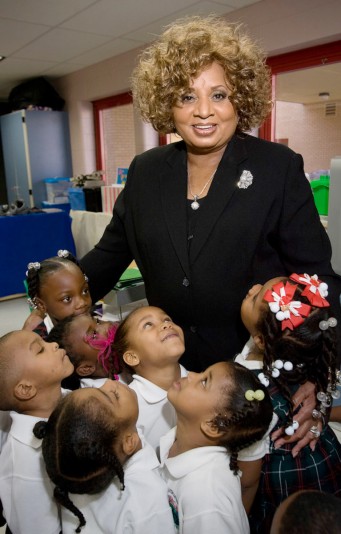In 2012, the Louisiana Board of Ethics formally accused Paulette Bruno, the head of Robert Russa Moton Charter School, of violating the state’s nepotism law for employing two daughters-in-law.
In 2014, the ethics board accused Doris Roché-Hicks of nepotism for employing her sister, daughter and son-in-law at Friends of King Schools, which she runs.
Today, those cases are still open. Both school leaders contend they didn’t break the law. And their family members have continued to work at the schools.
Generally speaking, the law on nepotism prohibits the head of a government organization from employing immediate family members. That includes one’s spouse, parents, mother- and father-in-law, children, children’s spouses, siblings and siblings’ spouses.
But there are a lot of exceptions. A teacher can work for a family member as long as he’s certified by the state and works in a classroom. The law also makes allowances for small, rural communities where avoiding family ties could make it hard to staff local government offices.
Willie Zanders Sr., the lawyer representing Roché-Hicks and Bruno, said the ethics board overlooked such exceptions that apply to their cases. That’s why he said he hasn’t recommended they dismiss any of their relatives.
4.5 yearsHow long Paulette Bruno has been fighting nepotism charges2.5 yearsHow long Doris Roché-Hicks has been fighting nepotism charges
Zanders said he believes he’s reached a settlement in Bruno’s case and expects the board to approve it soon. A status conference was held in March; another is set for later this month.
As for Roché-Hicks, he said, “We are exploring settlement options, but will continue to fight the charges, if necessary.”
The head of the state agency that handles ethics matters involving public employees said it doesn’t track how long it takes to resolve cases. So she couldn’t say whether it’s unusual for a case to go on for three or four years.
Ethics board Administrator Kathleen Allen did note that Bruno’s case has been delayed discovery and settlement negotiations. “It’s the nature of litigation and going back and forth in between two parties,” she said.
Neither school responded to The Lens’ inquiries regarding the relatives’ current employment status, but they were listed on the schools’ rosters at the beginning of the school year.
Paulette Bruno runs into trouble for employing two daughters-in-law
In November 2012, the Board of Ethics laid out its case against Bruno, principal and CEO of Moton.
Suzanne Encalarde began working at Moton in 2008 and became Bruno’s daughter-in-law in 2010. In 2011, based on Bruno’s recommendation, Moton’s board of directors promoted Encalarde and gave her a $3,000 raise, according to the ethics board.

L’Tanya Randolph Bruno was already Paulette Bruno’s daughter-in-law when she took a position as a data manager at Moton in 2009. Paulette Bruno signed the hiring forms, according to the ethics board. In 2011, Paulette Bruno approved a $3,000 raise for that daughter-in-law, too.
Under state law, agency heads aren’t allowed to hire immediate family members. If a particular situation is covered by an exception, the agency head can’t be involved in any decision about a promotion.
The ethics board treats charter school CEOs as the head of a government entity, just like they do school district superintendents, Allen said.
The board could censure Bruno and fine her up to $10,000, according to state law. It could also remove, suspend, or demote her daughters-in-law and fine each $10,000.
But Zanders said he and lawyers for the ethics board “agreed that the case would be dismissed.”
Encalarde is a certified teacher, he said. State law allows certified teachers to work for an immediate family member if the teacher works in a classroom.
Even so, the agency head can’t be involved in any personnel decisions regarding the relative.
For L’Tanya Randolph Bruno, Zanders pointed to an exception in state law that allows immediate family members of school board members to work for the school system in certain cases. But Paulette Bruno is the CEO, not a school board member.
The ethics board does not comment on open cases.
Charter school CEOs must file the same disclosure forms as superintendents if they employ immediate family members, Allen said.
Paulette Bruno didn’t file anything until the Board of Ethics charged her with nepotism.
Then she submitted disclosures for five years all at once, with a note saying she was doing so only because someone with the ethics board told her to. Bruno wrote that she shouldn’t have to file the forms because she’s not a superintendent or school board member.
The case against Roché-Hicks
In 2013, The Lens reported that Roché-Hicks, the CEO of Friends of King Schools, had hired six relatives.
The ethics board decided that three of those cases violated nepotism law. In 2014, the board filed charges against Roché-Hicks, her sister Iris Ponson, her daughter Monique Cook, and her son-in-law Darrin Cook Sr.
According to the ethics board, Roché-Hicks hired her daughter Monique Cook in 2012 to do consulting. Her daughter received almost $18,000. Roché-Hicks and the principal of Dr. Martin Luther King Jr. Charter School signed the checks, according to the ethics board.

State law forbids immediate family members of public servants from bidding on or entering into contracts.
Cook later went on to become a special education teacher at Joseph A. Craig Charter School, which is allowed if she works in a classroom.
Zanders contends that the classroom teacher exception should extend to her contract work.
Then there’s Monique Cook’s husband, Darrin Cook. Friends of King Schools hired him as head custodian of Dr. King School in 2006, six days after Roché-Hicks became principal, according to the ethics board.
Between the 2010-11 and 2013-14 school years, he was paid $182,530, according to the ethics board. This year he’s set to earn $53,040, according to state records.
Zanders said state law protects Cook’s employment because he had worked for the Orleans Parish School Board.
“He was working for OPSB before Katrina,” Zanders said. “He shouldn’t have to lose his job because his mother-in-law got a promotion.”
Roché-Hicks cited that law in disclosure forms filed with the state, at one point calling him a “skilled worker previously employed with OPSB.”
Roché-Hicks’ sister, Iris Ponson, received about $86,000 over four years as a hall monitor at Dr. King School, according to the ethics board. This year, she’s set to earn $14,200, according to state records.
Zanders said Roché-Hicks called the state ethics agency to clear Ponson’s hiring, and someone there gave her verbal approval.
That’s not something the ethics office would do, Allen said.
“We do not give opinions for the board over the phone,” Allen said. “We provide information as to what the law provides, but we don’t give opinions on particular cases.”

